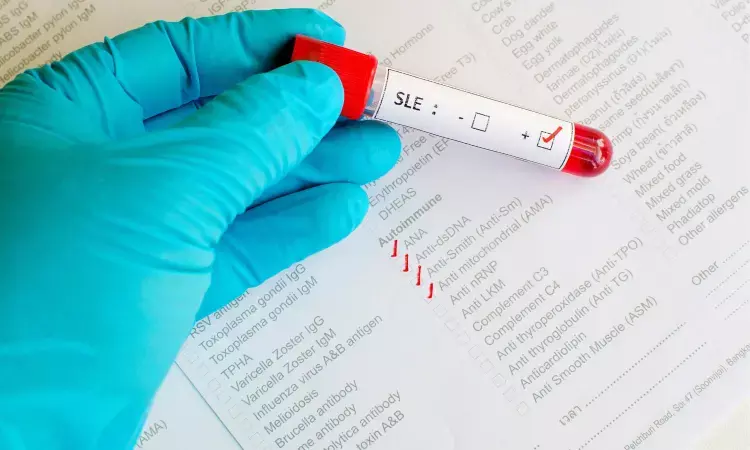- Home
- Medical news & Guidelines
- Anesthesiology
- Cardiology and CTVS
- Critical Care
- Dentistry
- Dermatology
- Diabetes and Endocrinology
- ENT
- Gastroenterology
- Medicine
- Nephrology
- Neurology
- Obstretics-Gynaecology
- Oncology
- Ophthalmology
- Orthopaedics
- Pediatrics-Neonatology
- Psychiatry
- Pulmonology
- Radiology
- Surgery
- Urology
- Laboratory Medicine
- Diet
- Nursing
- Paramedical
- Physiotherapy
- Health news
- Fact Check
- Bone Health Fact Check
- Brain Health Fact Check
- Cancer Related Fact Check
- Child Care Fact Check
- Dental and oral health fact check
- Diabetes and metabolic health fact check
- Diet and Nutrition Fact Check
- Eye and ENT Care Fact Check
- Fitness fact check
- Gut health fact check
- Heart health fact check
- Kidney health fact check
- Medical education fact check
- Men's health fact check
- Respiratory fact check
- Skin and hair care fact check
- Vaccine and Immunization fact check
- Women's health fact check
- AYUSH
- State News
- Andaman and Nicobar Islands
- Andhra Pradesh
- Arunachal Pradesh
- Assam
- Bihar
- Chandigarh
- Chattisgarh
- Dadra and Nagar Haveli
- Daman and Diu
- Delhi
- Goa
- Gujarat
- Haryana
- Himachal Pradesh
- Jammu & Kashmir
- Jharkhand
- Karnataka
- Kerala
- Ladakh
- Lakshadweep
- Madhya Pradesh
- Maharashtra
- Manipur
- Meghalaya
- Mizoram
- Nagaland
- Odisha
- Puducherry
- Punjab
- Rajasthan
- Sikkim
- Tamil Nadu
- Telangana
- Tripura
- Uttar Pradesh
- Uttrakhand
- West Bengal
- Medical Education
- Industry
Telitacicept promising for active SLE patients with safety, efficacy and acceptability

Although biological therapies like belimumab and anifrolumab have been approved for SLE patients, there is still a need for more effective and safe treatments. Research studies have demonstrated an association between SLE activity to B lymphocyte stimulator (BLyS) and proliferation-inducing ligand (APRIL) serum levels. Telitacicept, a novel fusion protein, inhibits both BLyS and APRIL effectively.
According to a study published in the Annals of Rheumatic Diseases, researchers have concluded that Telitacicept provides a novel option for patients with active SLE.
This phase 2b trial assessed telitacicept, a fusion protein that neutralizes B lymphocyte stimulator and proliferation-inducing ligand signals, in patients with active systemic lupus erythematosus. Two hundred forty-nine adult patients were recruited from 29 hospitals in China and randomly assigned to receive telitacicept at 80mg, 160mg, 240mg, or a placebo once weekly, plus standard therapy. The patients in these groups were 62, 63, 62 and 62, respectively.
The primary endpoint was the proportion of patients achieving an SLE Responder Index 4 response at week 48.
Key results of the study are:
- At week 48, the proportion of patients achieving an SRI-4 response in the 240 mg, 160 mg, 80 mg tellitacicept group, and placebo group was 75.8%, 68.3%, 71.0% and 33.9%.
- Significant treatment responses were observed in secondary endpoints, including a ≥4-point reduction on the Systemic Lupus Erythematosus Disease Activity Index, a lack of Physician's Global Assessment score worsening and a glucocorticoid dose reduction in the 240 mg group.
- Telitacicept was well tolerated.
- There were similarities between the telitacicept and placebo groups regarding adverse and severe adverse events.
Researchers added a note regarding the reason for withdrawal: "During the study, a significant number of participants withdrew from each group. The primary reasons for withdrawal from the telitacicept groups were related to AEs and other factors like pregnancy or loss of follow-up. The main reason for withdrawal in the placebo group was a lack of efficacy. Our strict study protocol and challenges in patient compliance may have contributed to the higher withdrawal rates in all groups."
All telitacicept groups displayed a higher proportion of SRI-4 responders than the placebo at week 48, and tolerability was good.
Reference:
Wu D, Li J, Xu D, et al. Telitacicept in patients with active systemic lupus erythematosus: results of a phase 2b, randomised, double-blind, placebo-controlled trial. Annals of the Rheumatic Diseases Published Online First: 21 December 2023. doi: 10.1136/ard-2023-224854
BDS, MDS in Periodontics and Implantology
Dr. Aditi Yadav is a BDS, MDS in Periodontics and Implantology. She has a clinical experience of 5 years as a laser dental surgeon. She also has a Diploma in clinical research and pharmacovigilance and is a Certified data scientist. She is currently working as a content developer in e-health services. Dr. Yadav has a keen interest in Medical Journalism and is actively involved in Medical Research writing.
Dr Kamal Kant Kohli-MBBS, DTCD- a chest specialist with more than 30 years of practice and a flair for writing clinical articles, Dr Kamal Kant Kohli joined Medical Dialogues as a Chief Editor of Medical News. Besides writing articles, as an editor, he proofreads and verifies all the medical content published on Medical Dialogues including those coming from journals, studies,medical conferences,guidelines etc. Email: drkohli@medicaldialogues.in. Contact no. 011-43720751


